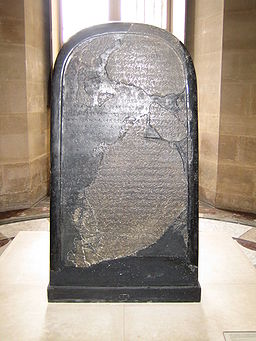- Mesha
-
El rey Mesha fue un rey de Moab del siglo IX a. C., una banda de tierra llena de colinas de la actual Jordania, al norte de Edom, al otro lado del Mar Muerto desde Judá hasta el valle del río Arnón. Los libros bíblicos de Samuel nos relatan que Moab había sido conquistado por David (alrededor de 1000-970 a. C.) y fue retenida entre los territorios de Salomón (m. 931 a. C.). La estela de Mesha, también conocida como la piedra moabita, indica que estaba aún bajo el dominio de reyes israelitas con centro en Samaria un siglo después. Mesha parece haber luchado con éxito por la libertad de Moab de Israel como indica la piedra moabita, que data de alrededor de 850 a. C. 2 Reyes 3:4 afirma que el "rey Mesha de Moab fue un criador de ovejas, que solía proporcionar al rey de Israel cien mil corderos, y la lana de cien mil carneros", pero también que más tarde se rebeló contra Joram, entonces rey del reino norteño de Israel. Aparte de estos testimonios, las referencias a Mesha son escasas, si es que existen.
Referencias
- "The Cambridge Ancient History", Vol. III Pt. i, 2nd Ed.; Boardman, Edwards, Hammond & Sollberger eds.; Cambridge University Press, 1982
- "Reading the Old Testament"; Lawrence Boadt; Paulist Press, 1984
- "The History and Religion of Israel"; G.W. Anderson; Oxford University Press, 1966
- Este artículo fue creado a partir de la traducción del artículo Mesha de la Wikipedia en inglés, concretamente de esta versión, bajo licencia Creative Commons Atribución Compartir Igual 3.0 y GFDL.
Wikimedia foundation. 2010.

